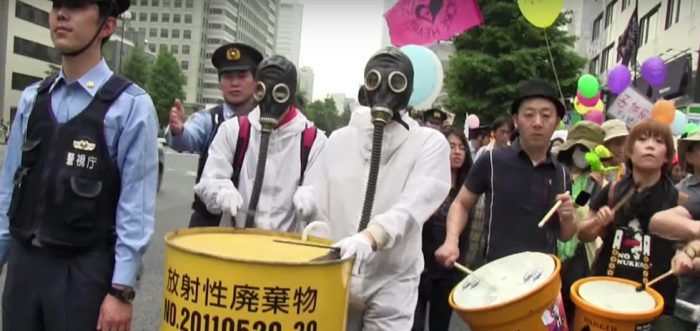
Made up of “footage shot and donated by ordinary citizens”, there’s a surprising coherency throughout Tell the Prime Minister, with the widely sourced footage composing a comprehensive study of the March 11 earthquake. Opening on a massive anti-nuclear protest – pointedly shot by a citizen, rather than a media organisation – the extent of disarray around disaster is palpable, with the immediate contrast with the lack of coverage of the protest making the intention of the documentary clear from the first few minutes. Eiji Oguma’s film seeks to show how the movement he was involved with was ignored in such a way, and the ways in which is succeeded despite this.
Naoto Kan – Prime Minister at the time as well as an interview subject throughout the film. Nato’s early presence in the documentary offers an indication as to the nature of the documentary. That is, this isn’t a work that simply articulates the perspectives of the protesters at the centre of the work; and instead, seeks to demonstrate the breadth of those who are concerned with the issues at hand. It’s through this very circumstance that Tell the Prime Minister is able to develop such a legitimacy as a film. The interview subjects that punctuate the documentary range from Misao Redwolf – an activist who wears a flu-mask – Norimichi Hattori – the head of a children’s care supplies group – to other who lived in the affected areas; as well as their family members.
There’s a focus throughout on how the government in Japan approached the issue of 50 million people living within the radioactivity zone – with a crippling anxiety as to how the country would react to an evacuation of that size. The degree of the disaster is also churned out through found footage of weather forecasts showing the problem as one extending to Tokyo through rain and weather patterns. From the disappearance of food to people buying Gieger counters, the use of footage submitted from an extensive range of citizen sources results in a comprehensive image of the atmosphere at the time of the disaster – where uncertainty and anxiety permeated every day behaviour.
This submitted footage is coupled with detailed anecdotal accounts: figures reflecting on having to search the internet at the time, due to the lack of coverage – looking for information on what was happening. The state of being “anxious and full of rage” is cut against the lack of “Japanese reporters covering the protest” – a perceived shared apathy between politicians and the media in the country, contrast with the growing concern in the population – giving the documentary a stark emotional element to empathise with. The sense of desperation comes across in rallies late in the film, as the protests fail to gain the media coverage they feel they need, with one mother breaking down mid speech stating: “our children are completely exposed…we have to get angry.” Tell the Prime Minister is about this anger; both how it initially manifests, to how it is later harnessed and pushed into reform.
Whilst Tell the Prime Minister is a documentary about a specific issue, the thorough nature of what ends up recorded also gives audiences an insight into the process of legitimising an issue through activism in Japan. More precisely, the film opens with characters expressing their anger and fear around the disasters; seen most prominently through their mass protests. With Eiji’s careful pacing over the course of the documentary, however, we see this develop into policy proposals, into MCAN (Metropolitan Coalition Against Nukes), and into tense but cathartic meetings between Japan’s Prime Minister and those leading the movement. In the meeting with Yoshihiko Noda, we’re shown the limits of polite bureaucracy with MCAN asking “how can a government that can’t deliver safety now promise it in the future?”
From the immediate aftermath, through to the election of the conservative LDP – and the announcement to reopen nuclear plants, with no real timeline given – we’re shown precisely what this documentary wants to depict: a series of protests developed into a movement, developed into a policy. Eiji portrays the stark importance of this detailed process, whilst contrasting it with the manner in which the media within the country ignore it – and in many ways, how the populist nature of Japan’s politics allowed success over time. Tell the Prime Minister succeeds as a multifaceted and thorough look at the political and media establishments in Japan, showing how one group managed to make a dent – as well as the sheer effort that it took to make it.
